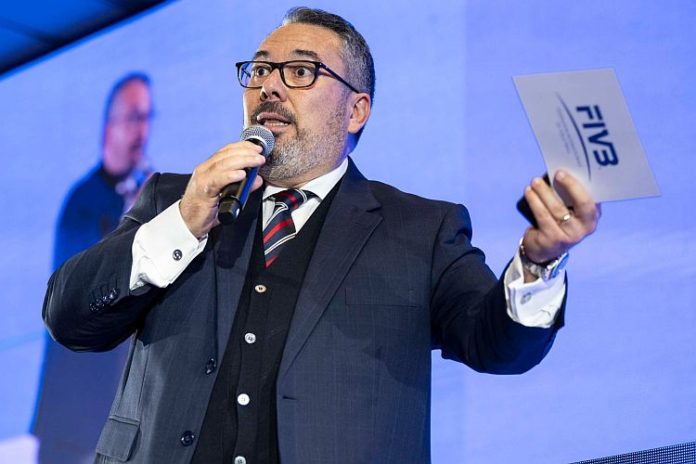★ The Sports Examiner: Chronicling the key competitive, economic and political forces shaping elite sport and the Olympic Movement.★
★ To get the daily Sports Examiner Recap by e-mail: sign up here! ★
≡ SPOTLIGHT ≡
Brazil’s Fabio Azevedo ascended from Secretary General of the International Volleyball Federation (FIVB) to President at the federation’s 39th World Congress in Portugal in mid-November and was eager to share his plans for growth.
Like getting 1.6 billion people involved annually with volleyball, and growing the FIVB’s annual revenues to over $100 million.
He shared his vision – and considerable enthusiasm – with reporters during an online roundtable on Tuesday, explaining in a concise way where he wants to take the sport:
“Basically today, in the ecosystem of the FIVB, we have what we call ‘the trilogy’: we have the FIVB as the international governing body managing the sport; we have Volleyball World, our private company in partnership with CVC Capital, taking care of business, promotion, marketing and commercialization of our events, and we have the Volleyball Foundation, which we launched this year in May, which is focused on the social responsibility and attending every single project promoting the values of the sport in the world.
“So basically, if I may explain, we have volleyball empowerment, led by the FIVB, helping the national teams. We have development, helping those national teams that do not get yet a national team program, and we have now the Volleyball Foundation, fighting for mass participation.”
He explained that the FIVB now has a reasonable idea of how many people are touched by the sport annually:
“We have nowadays, by research and using research, a number of 800 million people somehow connected with the sport in the world , and we want to make our sport more accessible and we want to double this fan base, this market share, in the next eight years.”
Key to this is the commercial development of the sport, keyed by the FIVB’s unprecedented joint venture with CVC Capital Partners in 2021. Azevedo was at the ready with details on just how important this partnership has been already and will be the future:
“We have started this journey, having volleyball as a business. The valuation, let’s call it, the valuation of volleyball was about $27 million EBITDA [earnings before interest, taxes, depreciation and amortization] average per annum, in the Olympic cycle.
“The expectation of the next Olympic cycle, to 2028, is moving from $27 million to $60 [million], so doubling, all right, and the expectation from 2028 to 2032 is almost doubling again, to $105 [million]. So what does that mean?
“That means there is no way for the business to grow if the sport does not grow together. So what we are doing is investing massively in the quality and consistency of our events – again, TV production, content production and content distribution – you saw that we got for the second year in a row, the best IF in terms of social-media evaluation, social media importance, meaning that the way we are investing in our product – in our competitions, in our athletes, our stars – is really to make the sport better.”
The Volleyball World joint venture was initially valued at $300 million, with $100 million in cash invested by CVC. Azevedo believes that value could be $1.3 billion by 2032, a 4.3/1 increase in just 11 years. Azevedo observed:
“That was a great initiative of the FIVB partnering with CVC and professionalizing completely our commercial arm. This one moved our sport to the next level and as you can see, in the next two Olympic cycles as well. …
“In 2023, we distributed 53% of our entire revenue in prize money and volleyball empowerment. Next two years, it has been approved by the FIVB Congress in Porto – next two years – average of 59%. We’re expecting 70% of our revenue to be distributed in 2028. So, meaning that … the money that comes from sport is going back invested into the sport.”
As for revenue, Azevedo noted, in rough terms, that 35% of revenues come from hosting fees, another 35% from media rights, distribution and betting, 10-15% from sponsorship and 5% from the Volleyball World streaming channel.
The FIVB financial report distributed to the Congress showed CHF 28.9 million in revenue for 2023 and CHF 50.21 million in revenue for 2022 (CHF 1 = $1.13 U.S.). The FIVB report explained that the federation receives a dividend from the Volleyball World profits: $38.9 million in 2022 and $18.2 million in 2023.
How is the FIVB going to get to these new heights?
Azevedo stressed “content production and distribution is making the sport more accessible and it is equally inspiring a new generation of fans.”
He pointed specifically to beach volleyball:
● “We know that beach volleyball is nowadays a great success in the Olympic Games, like in Paris for example, very recently, but we are still having a gap of beach volleyball between the Games, and we want to make the same investment we made for volleyball – for the Volleyball Nations League – into beach volleyball annual competition, so we want to have the turnaround of beach volleyball.”
● “We do believe here, the professional team of the FIVB, that beach volleyball is the focus for the future in terms of the mass participation and making the sport more accessible.”
He also wants to get more national indoor teams involved. For example, out of the 222 national federations in the FIVB, only 86 men’s teams and 77 women’s teams are listed in the FIVB world rankings.
“We want to double this number in the next four years, and how are we going to do that? Once again, empower every single member of our family.”
One way to do this is to get less-qualified national teams involved in zonal association tournaments, where they can play at a competitive level and earn world ranking points. This sets them up to receive FIVB Volleyball Foundation support to identify talent and improve their teams. More participation means better national-team performance and can inspire new interest from players and fans.
The FIVB has distributed $40 million in development funding to 201 countries and wants to do more.
Looking ahead to 2028, Azevedo was asked about venues for the 2028 Olympic Games in Los Angeles, which have not been confirmed. He was enthusiastic about the final outcome of the venue arrangements:
“Obviously, defining the venues of the Olympic Games is absolutely important. However, I have to say to you that it’s quite normal having these sorts of discussions four years in advance.
“We had the same thing in Rio, same thing for Tokyo, same thing for Paris as well if you remember, so I would say nowadays we have got a great relationship with LA 2028 … so we are confident, very confident that we’re going to soon announce the venues for both beach volleyball and volleyball and both will be spectacular in L.A. as well, like we had in Paris.”
The FIVB has an unusual arrangement in that new Secretary General Hugh McCutcheon (NZL) is in Minneapolis (and not at the Lausanne headquarters), where he was a long-time coach, but is now in a position to help with promotional activities in the under-developed – from a volleyball perspective – U.S. market, as well as liaise with the LA28 Olympic organizers.
Azevedo does not lack for enthusiasm and the early returns from the Volleyball World partnership are quite promising. As he was elected for the period of 2024-32, he has eight years to achieve his vision, one which has volleyball expanding dramatically around the world.
¶
★ Receive our exclusive, weekday TSX Recap by e-mail by clicking here.
★ Sign up a friend to receive the TSX Recap by clicking here.
★ Please consider a donation here to keep this site going.
For our updated, 885-event International Sports Calendar for the rest of 2024, 2025 and beyond, by date and by sport, click here!


























